Kismet
Musical (1953)
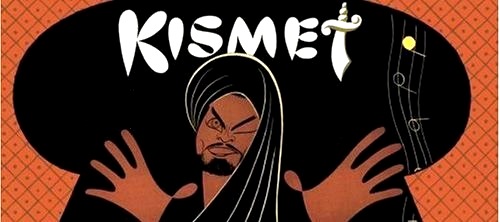
Avec trois Tony Awards (dont celui de la meilleure comédie musicale), une version télévisée et un film à succès de la MGM, Kismet est l'une des comédies musicales les plus renommées à avoir honoré la Great White Way. Kismet a fait ses preuves auprès du public à maintes reprises, grâce à son cadre exotique, ses personnages attachants et son sens de l'humour ironique... sans oublier une partition luxuriante adaptée des mélodies envoûtantes d'Alexandre Borodine.
Source
Le musical a été commandé par Edwin Lester, fondateur et directeur du Civic Light Opera de Los Angeles, qui a conçu un musical basée sur la pièce Kismet d’Edward Knoblock de 1911. Lester avait déjà produit Song of Norway, avec la même équipe, adaptant les mélodies d’Edvard Grieg. Pour Kismet, les auteurs se sont emparés des mélodies d’Alexandre Borodine, qui avaient une juste saveur exotique et des mélodies luxuriantes.
Création aux États-Unis (Los Angeles, San Francisco , Broadway) (1953)
Kismet a été créé à Los Angeles, puis s’installe à San Francisco à l’été et à l’automne 1953. Un changement important a eu lieu pendant les previews transformant le caractère de Hajj d’un simple mendiant à un mendiant-poète. Charles Lederer devint producteur et librettiste. La production déménage alors à Broadway le 3 décembre 1953, jouant au Ziegfeld Theatre. La mise en scène est d'Albert Marre, avec une chorégraphie de Jack Cole et de somptueux décors et costumes de Lemuel Ayers. La distribution originale a mis en vedette Alfred Drake dans le rôle du poète Hajj, Doretta Morrow comme sa fille Marsinah, Richard Kiley comme le jeune calife de Bagdad, Henry Calvin comme le Wazir, et Joan Diener comme Lalume, la femme vampy du Wazir. Bill Johnson plus tard a repris le rôle de Hajj, et Elaine Malbin le rôle de Marsinah.
Manque de bol, le spectacle a ouvert à Broadway en pleine grève de la presse. Comme les critiques des journaux n’étaient pas disponibles, les producteurs ont utilisé la publicité télévisée pour promouvoir le spectacle. Le musical a trouvé son public et a connu un vrai succès durant 583 représentations, remportant le Tony Award for Best Musical. Paradoxalement, la grève a peut-être finalement contribué à la popularité du spectacle, puisque les critiques, arrivant quelques semaines après l’ouverture, n’ont pas toutes été favorables. Un critique, pointant sur le nom du compositeur Borodine, a dénigré la partition comme «a lot of borrowed din». Walter Kerr a écrit que : «It's the sort of show that would sell its soul for a joke, and the jokes should be better at the price.» William Hawkins, cependant, a écrit qu’il était «noisy, spectacular, and vigorous. ... It is melodic and gay.»
Création à Londres (1955)
Kismet connut encore un plus gros succès dans le West End de Londres, avec 648 représentations au Stoll Theatre à partir d’avril 1955. La production londonienne a ouvert avec les trois vedettes de la distribution de Broadway, Drake, Morrow et Diener. Ils ont ensuite été remplacés par Tudor Evans, Elizabeth Larner et Sheila Bradley, respectivement.
Revivals
Le musical est repris au New York State Theatre du Lincoln Center, à partir du 22 juin 1965, pour 39 représentations avec Drake, Lee Venora, Anne Jeffreys et Henry Calvin.
Abandonnant le contexte oriental luxuriant de l’original, un revival rebaptisé Tombouctou! a ouvert au Mark Hellinger Theatre le 1er mars 1978 et a tenu l'affiche pour 243 représentations. Cette version, avec un nouveau livret de Luther Davis, déplace l’histoire en Afrique, avec des décors minimalistes. L’accent de l’intrigue a été déplacé, avec Eartha Kitt dans le rôle de Lalume.
Le New York City Opera présente le musical en octobre 1985, avec George Hearn (Hajj) et Maryanne Telese (Marsinah) sous la direction de Frank Corsaro. Un enregistrement en studio du musical a été réalisé en 1991 avec Samuel Ramey, Ruth Ann Swenson, Jerry Hadley, Dom DeLuise, Mandy Patinkin et Julia Migenes.
Le New York City Center Encores! a présenté une version semi-concert en février 2006, mettant en vedette Brian Stokes Mitchell et Marin Mazzie.
Le musical a été repris en 2007 par l’English National Opera au London Coliseum et a mis en vedette le vétéran du West End Michael Ball et Alfie Boe.
Adaptations au cinéma et à la télévision
Le musical a été transformé en film Cinemascope en 1955 par la MGM, réalisé par Vincente Minnelli et mettant en vedette Howard Keel dans le rôle de Hajj, Ann Blyth dans celui de Marsinah, Dolores Gray dans celui de Lalume et Vic Damone dans celui du calife. Le quatuor This is My Beloved a été remplacé par un trio, parce que Sebastian Cabot, qui jouait le Wazir, ne pouvait pas chanter.
Une version pour la télévision, filmé à l'Armstrong Theater a été diffusée en 1967 avec Barbara Eden comme Lalume, José Ferrer comme Hajj, Anna Maria Alberghetti comme Marsinah et George Chakiris comme le calife. Le script a été adapté pour une diffusion de 90 minutes, mais il a coupé peu de numéros musicaux malgré le temps d’exécution plus court.
Avec une extrême intelligence et une bonne dose de chance, le pauvre poète de rue, Hajj, quitte les rues de Bagdad pour être couronné Emir par le Wazir de Bagdad. Pendant ce temps, le Wazir essaie désespérément de trouver une princesse étrangère riche pour que le Calife se marie. Ce plan tombe à pic lorsque le Calife tombe amoureux de la belle fille de Hajj, Marsinah, à l’insu de Hajj. Ainsi, Hajj aide le Wazir mais risque de perdre son gendre. Après une série d’aventures, le calife et Marsinah sont en mesure de poursuivre leur histoire d’amour tandis que Hajj est récompensé par gagner l’affection de la veuve sexy du Wazir, Lalume.
Afficher le synopsis détaillé
Kismet is set in a fictional Baghdad in the times of The Arabian Nights.
Acte I
At a mosque, an imam prays as the sun rises (The Sands of Time). Three beggars sit outside the temple, but the fourth, Hajj, has gone to Mecca. Crying Rhymes! Fine Rhymes!, a poet enters to sell his verses. His beautiful daughter Marsinah joins in the sales pitch, but they have no success (Rhymes Have I). Marsinah is sent to steal oranges in the Bazaar for their breakfast, while her father sits down to beg. When the beggars object to the poet taking Hajj's place, he claims to be a cousin of Hajj. The poet threatens to curse those who do not give him money and soon earns a few coins (Fate). Hassen-Ben, a huge man from the desert, mistakes him for Hajj and kidnaps him. The poet (who is referred to as Hajj thereafter) is taken to Jawan, a notorious brigand. Fifteen years ago, the real Hajj had placed a curse on Jawan that resulted in the disappearance of the brigand's little son. Now he wants the curse removed. The new Hajj, seeing an opportunity to make some money, promises to do so for 100 gold pieces. Jawan leaves for Baghdad to search for his son, and Hajj rejoices in his new-found riches (Fate (reprise)).
Back in the city, the Wazir of Police comes through the busy Bazaar (Bazaar of the Caravans). The evil Wazir and his seductive, beautiful wife-of-wives, Lalume, discuss a loan he desperately needs. In return for the money lent from the King of Ababu, the Caliph must marry one (or all three) of the Princesses of Ababu, who perform a sexy dance. Through their amah, the princesses tell Lalume that they wish to return home. Lalume convinces them that Baghdad is much more exciting than any other place on earth (Not Since Nineveh).
Marsinah is being pursued by a fruit merchant whose wares she has stolen. Her father arrives to rescue her, giving the man money. Hajj gives his daughter half of the money and leaves. The merchants set out their finest Baubles, Bangles and Beads for the young lady. The young Caliph and his advisor, Omar, have been traveling incognito. He is struck by Marsinah's beauty and follows her. Elsewhere, Hajj is basking in the glow of some scantily-dressed slave girls he has just bought, when he is stopped by the police, who are checking identities because they are looking for Jawan. The Chief recognizes, on the coins, the crest of a family Jawan has robbed and arrests Hajj as a thief. Meanwhile, Marsinah has found a quaint little house with a beautiful garden to buy for her father and herself. She is admiring the garden when the Caliph slips in and, pretending to be a gardener, introduces himself to her. They fall in love on the spot (Stranger in Paradise). They promise to meet again in the garden at moonrise. The Caliph tells Omar that he has fallen in love, and some policemen overhear (He's in Love).
At the Wazir's Palace, Hajj is on trial for the theft of 100 pieces of gold. The Wazir has no need for evidence; he sentences Hajj to 20 lashes, and his right hand is to be cut off. The poet pleads that, as a poet and storyteller, the loss of a hand would cripple his career. It is the gesture that tells the story (Gesticulate). The lovely Lalume, attracted to the handsome poet, begs her husband for forgiveness, but the Wazir is not convinced, and Hajj gets more lashes. As Hajj curses the Wazir, a guard bursts in with news that they have captured Jawan. The old brigand is brought in and asks Hajj where his son is. He sees, around the Wazir's neck, a medallion that his son was wearing when he was captured. The Wazir is his son! Jawan praises the power of the great magician, Hajj, a man who has the power to curse and uncurse. Jawan is thrilled to see his son, but the Wazir sentences his own father to death. "For the leading judge of Mesopotamia to have as a father the leading criminal of Mesopotamia," he says, is "a disturbing thought."
As Jawan is led to his execution, the Wazir realizes that the "powerful magician" has cursed him. Just when he is about to murder Hajj, the Caliph enters with news that he has found a bride, a commoner, and that he will marry her tonight. The Wazir is distraught: if the Caliph does not marry a princess of Ababu, the Wazir will be ruined. He concludes that this is a result of Hajj's curse and begs Hajj to reverse the situation, promising him a reprieve and the title of Emir. Hajj agrees. Lalume knows that the poet is no wizard, but she decides that he may be her chance out of a dull life (Bored) and is falling in love with him; she promises to help. When the Wazir returns, Hajj sings a mystic-sounding invocation to fate as the slave-girls dance wildly, distracting the Wazir. Hajj jumps out of a window, leaving his coat behind him. When the Wazir sees he is gone, he clutches the cloak in amazement and faints.
Acte II
The Caliph and his wedding procession approach the house of his beloved (Night of my Nights). Inside, Marsinah thinks only of her gardener (Stranger in Paradise (reprise)). Hajj enters and tells her of his situation and says that they must flee immediately to Damascus, but Marsinah refuses to go. They argue, and he nearly strikes her before he runs off, ashamed. She departs in the opposite direction. When the Caliph enters the garden, his love is not there.
The Wazir is informed by his spies that the Caliph's bride has disappeared. He rejoices at the power he wields, by having a magician as Emir (Was I Wazir?). He instructs Lalume to keep his new Emir happy, and she is eager to comply (Rahadlakum). Hajj and Lalume are discussing a trip to a "small oasis, a week's travel by camel" when Marsinah enters the Harem. Father and daughter reconcile, and she tells him of her lover and asks him to find him. At the same time, the Caliph, in the next room, orders the Wazir to find his love (And This Is My Beloved). Hajj and Omar encounter each other and engage in a battle of wits (The Olive Tree).
The Wazir, hoping to convince the Caliph that only wanting one wife is just a phase, shows him his harem through a peephole where he sees Marsinah. The Caliph is horrified that his love is a member of the Wazir's Harem! The Wazir, sure that Hajj has arranged the whole thing, claims that she is one of his wives. The Caliph, heartbroken, agrees to choose his wife-of-wives that night during his diwan. So as not to have lied to his prince, the Wazir immediately marries Marsinah, promising to visit her that night. She vows to kill herself if he does.
That night, at the Caliph's diwan, the candidates for his hand dance for him: Princess Zubedya of Damascus, Princess Samaris of Bangalore, and the Three Ababu Princesses. The Caliph is unmoved. Hajj is searching for Marsinah; the Wazir thanks the "wizard" for placing the Caliph's beloved in his own harem. Laughing, he tells him that he has married the pretty little Marsinah. Realizing what has happened, Hajj pulls a knife, but has a better idea. He takes a blank plaque from his turban and throws it in a pool, proclaiming that when it is retrieved, it will read the name of the Caliph's fated bride. He secretly gives the Wazir another tablet, this one with the name Ababu written on it, and tells him to substitute it for the tablet from the pool. When the Wazir enters the pool, Hajj trips him and holds him underwater until he drowns.
Hajj explains all to the Caliph, who is joyfully reunited with Marsinah. The Caliph is ready to pardon Hajj for his murder of a public official, but the poet requests, as his punishment, to be "banished to some dreadful oasis ... at least a week's journey away by camel," and to be made to comfort the Wazir's widow in her "grief". As the two couples unite, the poet reflects on the fleetingness of The Sands of Time.
Acte I
"Sands of Time" – Imam of the Mosque
"Rhymes Have I" – Hajj and Marsinah
"My Magic Lamp" - Marsinah†
"Fate" – Hajj
"Bazaar of the Caravans" – Street Dancer, Akbar, Assiz, Merchants and Shoppers
"Not Since Nineveh" – Lalume, The Wazir of Police, Three Princesses of Ababu, Akbar, Assiz, Merchants and Shoppers
"Baubles, Bangles and Beads" – Marsinah
"Stranger in Paradise"* – Caliph and Marsinah
"He's in Love!" – Chief Policeman, Second Policeman, Prosecutor, Three Princesses of Ababu, Akbar, Assiz, Caliph and Omar
"Gesticulate" – Hajj and Wazir's Council
"Bored"† – Lalume
"Fate" (Reprise) – Hajj and Ladies of the Wazir's Harem
Acte II
"Night of My Nights" – Caliph and Entourage
"Stranger in Paradise" (Reprise) – Marsinah
"Baubles, Bangles, and Beads" (Reprise) – The Caliph
"He's in Love!" (Reprise) – Entourage
"Was I Wazir?" – The Wazir of Police, Policemen and Guards
"Rahadlakum" – Hajj, Lalume, Princess Zubbediya of Damascus, Princess Samaris of Bangalore, Three Princesses and Wazir's Harem
"And This Is My Beloved" – Marsinah, Caliph, Hajj and The Wazir of Police
"The Olive Tree" – Hajj
"Ceremonial of the Caliph's Diwan" – Diwan Dancers
"Presentation of Princesses" – Princess Zubbediya of Damascus, Ayah, Princess Samaris of Bangalore and Three Princesses of Ababu
"Finale" – Ensemble and Hajj
Aucun dossier informatif complémentaire concernant Kismet
Aucun dossier informatif complémentaire concernant Kismet
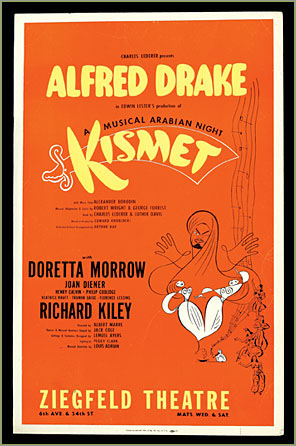
Version 1
Kismet (1953-12-Ziegfield Theatre-Broadway)
Type de série: OriginalThéâtre: Ziegfield Theatre (Broadway - Etats-Unis) Durée : 1 an 4 mois 3 semaines Nombre : 583 représentationsPremière Preview : 03 December 1953
Première: 03 December 1953
Dernière: 23 April 1955Mise en scène : Albert Marre • Chorégraphie : Jack Cole • Producteur : Star(s) : Avec: Omar ... Philip Coolidge / A Public Poet, later called Hajj ... Alfred Drake / Marsinah, his daughter ... Doretta Morrow / Jawan ... Truman Gaige / The Wazir of Police ... Henry Calvin / Lalume ... Joan Diener / The Caliph ... Richard Kiley / Princess Zubbediya of Damascus ... Florence Lessing / Princess Samaris of Bangalore ... Beatrice Kraft / Imam of the Mosque ... Richard Oneto
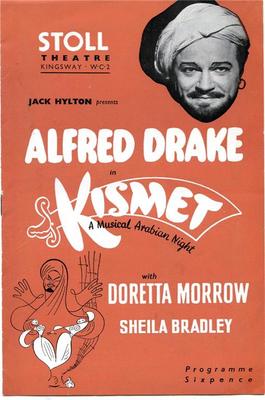
Version 2
Kismet (1955-04-Stoll Theatre-London)
Type de série: Original LondonThéâtre: Stoll Theatre (Londres - Angleterre) Durée : Nombre : 648 représentationsPremière Preview : 10 April 1955
Première: 10 April 1955
Dernière: InconnuMise en scène : Chorégraphie : Producteur : Star(s) : Avec: Hajj ... Alfred Drake / Marsinah ... Doretta Morrow / Lalume ... Joan Diener
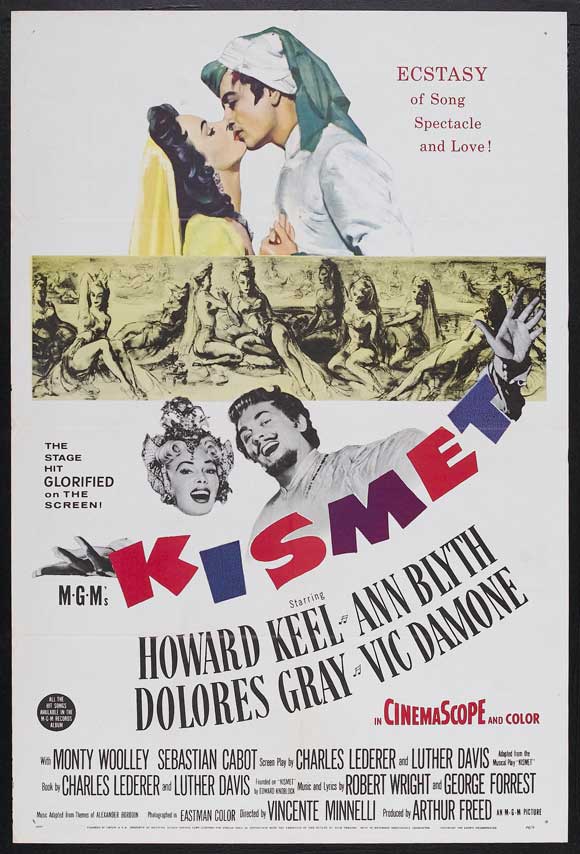
Version 3
Kismet (1955-10-Film)
Type de série: FilmThéâtre: *** Film (*** - ***) Durée : Nombre : Première Preview : 08 October 1955
Première: 08 October 1955
Dernière: InconnuMise en scène : Vincente Minnelli • Chorégraphie : Producteur : Star(s) : Avec: The Poet (Hajj) ... Howard Keel / Marsinah ... Ann Blyth / Lalume ... Dolores Gray / The Caliph ... Vic Damone / Omar ... Monty Woolley / Wazir ... Sebastian Cabot / Jawan ... Jay C. Flippen / Hassan-Ben ... Jack Elam / Chief Policeman ... Mike Mazurki / Second Policeman ... Ted de Corsia
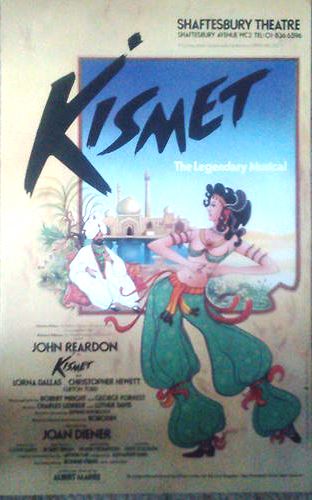
Version 4
Kismet (1978-03-Shaftesbury Theatre-London)
Type de série: RevivalThéâtre: Shaftesbury Theatre (Londres - Angleterre) Durée : Nombre : Première Preview : 21 March 1978
Première: 21 March 1978
Dernière: InconnuMise en scène : Albert Marre • Chorégraphie : Bonnie Evans • Producteur : Star(s) : Avec: John Reardon (Hajj), Loma Dallas (Marsinah), Joan Diener (Lalume), Clifton Todd (Caliph), Sheila O’Neill (Princess), Paul Bacon (Omar Khayyam), Christopher Hewitt (Wazir)Commentaires : It received very poor notices and closed after just three months.
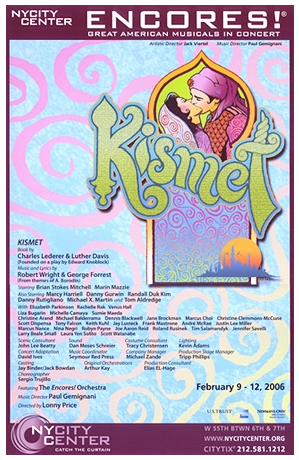
Version 5
Kismet (2006-02-New York City Center-New York) Encores!
Type de série: ConcertThéâtre: New York City Center (Broadway - Etats-Unis) Durée : Nombre : 5 représentationsPremière Preview : 09 February 2006
Première: 09 February 2006
Dernière: 12 February 2006Mise en scène : Lonny Price • Chorégraphie : Sergio Trujillo • Producteur : Star(s) : Avec: Hajj ... Brian Stokes Mitchell / Lalume ... Marin Mazzie / Caliph ... Danny Gurwin / Jawan ... Tom Aldredge / Omar ... Randall Duk Kim / Wazir ... Danny Rutigliano / Marsinah ... Marcy Harriell
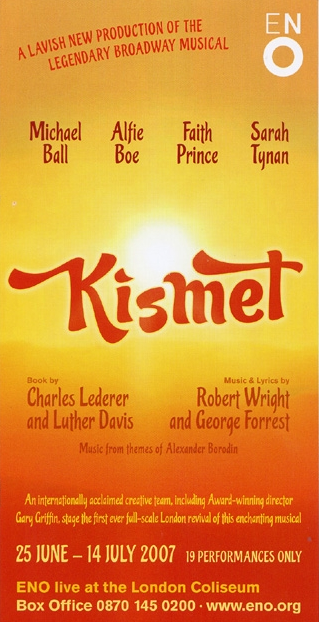
Version 6
Kismet (2007-06-Coliseum Theatre-London)
Type de série: RevivalThéâtre: Coliseum Theatre (Londres - Angleterre) Durée : 2 semaines Nombre : 19 représentationsPremière Preview : 26 June 2007
Première: 27 June 2007
Dernière: 14 July 2007Mise en scène : Gary Griffin • Chorégraphie : Nikki Woollaston • Producteur : Star(s) : Avec: Hajj/Poet ... Michael Ball / Lalume ... Faith Prince / Marsinah ... Sarah Tynan / Imam ... Donald Maxwell / Wazir ... Graeme Danby / Caliph ... Alfie Boe / Chief Policeman ... Rodney Clarke
Pas encore de video disponible pour ce spectacle